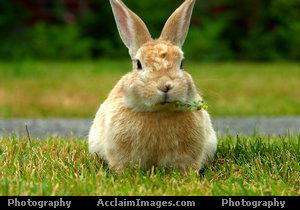What to Feed a Pet Rabbit
The typical diet for a pet rabbit should consist of water, hay,
pellets, fresh vegetables, and its own caecal pellets. Anything
else, including fruit and other treats should be given only in
very limited quantities, as it may cause obesity in a rabbit.
Pellets should be less than a couple of months old to ensure
freshness, and should consist of a minimum of 18% fiber, low
protein (14–15%), and less than 1% calcium. Depending on the
amount of vegetables available, an adult rabbit should be given
between ¼ and ½ cup of pellets per 6 pounds body weight (20 ml to
40 ml per kilogram) daily.
Pellets for Pet Rabbits
Pre-adolescent and adolescent rabbits(7 months and younger)
can be given as much pellets as they can consume, although
additional vegetables are preferable to additional pellets.
An older rabbit (over six years) can be given more pellets if they
are having difficulty maintaining a steady body weight.
Timothy hay-based pellets are great for rabbits that
have stopped growing and do not need to gain weight.
Alfalfa-based pellets are best only for young, growing bunnies or
older bunnies who are under-weight.
Pellets were originally designed for rabbit breeders for the
purpose of providing as much food energy and vitamins as
inexpensively as possible. This is optimal when the rabbits are
being bred for food or for experimentation, but the long-term
effects of a pellet-based diet on rabbits are quite negative,
resulting in an obese, unhappy, and unhealthy rabbit.
Vegetables for Pet Rabbits
Vegetables are essential to the health of rabbits. At least two
cups of three different vegetables per 6 lb (170 ml/kg) of body
weight should be fed to the rabbit daily, ideally half in the
morning around sunrise, and half in the evening around sunset, as
this is when wild rabbits most frequently graze. Remove
vegetables that have not been consumed within a half-hour, as
they can develop unhealthy amounts of bacteria. A wide variety of
vegetables will result in the healthiest rabbit; preferably a
combination of dark green vegetables and a root vegetables. Stay
away from beans or rhubarb, as they can cause the rabbit to
become sick. Additionally, it is wise to select vegetables that
are high in Vitamin A.

Hay for Pet Rabbits
Hay is essential for the health of all rabbits. A steady supply
of hay will help prevent hairballs and other digestive tract
problems in rabbits. Additionally, it provides a number of
necessary vitamins and minerals at a low calorie cost. Rabbits
should be provided with a constant, unlimited supply of hay for
their consumption. Rabbits enjoy chewing on hay, and always
having hay available for the rabbit may reduce its tendency to
chew on other items in the house. It is also a good idea to
provide hay in the rabbit's litter box, as rabbits enjoying
munching on food while they are defecating.
Timothy hay and other grass hays are considered the healthiest to
provide the rabbit. As a persistently high blood calcium level
can prove harmful to the rabbit, hays such as alfalfa and clover
hay should be avoided. Alfalfa is also relatively high in
calories, and a constant diet of it can cause obesity in rabbits.
Treats for Pet Rabbits
Treats are unhealthy in large quantities for rabbits, just as
they are for humans. Most treats sold in pet stores are filled
with sugar and high food energy carbohydrates. These should be
avoided; the vitamins they claim to provide are not needed, since
the vegetables will provide all the vitamins the rabbit needs. In
addition, they contain high quantities of sugar and other simple
carbohydrates which will make the rabbit obese. If determined to
feed the rabbit treats, the best treat to provide it with is
fruit. Papaya is an excellent fruit to use as an occasional treat
for bunnies. Papaya contains an enzyme that helps eliminate hair
balls. Look for dried papaya with no sugar added, and feed only a
very small amount per day.
Safe
Vegetables & Fruits for Pet Rabbits